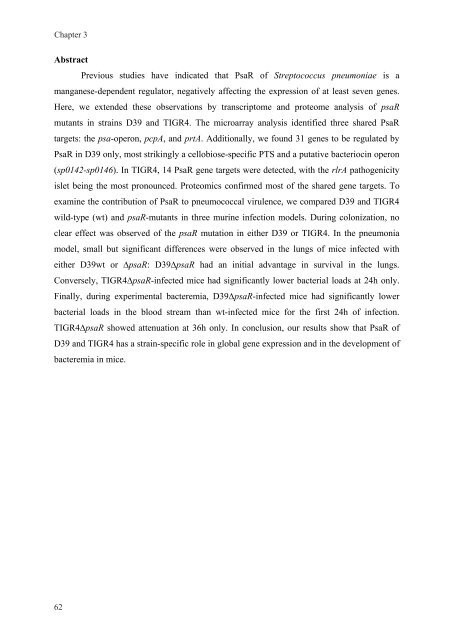Gene regulation in Streptococcus pneumoniae - RePub - Erasmus ...
Gene regulation in Streptococcus pneumoniae - RePub - Erasmus ...
Gene regulation in Streptococcus pneumoniae - RePub - Erasmus ...
Create successful ePaper yourself
Turn your PDF publications into a flip-book with our unique Google optimized e-Paper software.
Chapter 3<br />
Abstract<br />
62<br />
62<br />
Previous studies have <strong>in</strong>dicated that PsaR of <strong>Streptococcus</strong> <strong>pneumoniae</strong> is a<br />
manganese-dependent regulator, negatively affect<strong>in</strong>g the expression of at least seven genes.<br />
Here, we extended these observations by transcriptome and proteome analysis of psaR<br />
mutants <strong>in</strong> stra<strong>in</strong>s D39 and TIGR4. The microarray analysis identified three shared PsaR<br />
targets: the psa-operon, pcpA, and prtA. Additionally, we found 31 genes to be regulated by<br />
PsaR <strong>in</strong> D39 only, most strik<strong>in</strong>gly a cellobiose-specific PTS and a putative bacterioc<strong>in</strong> operon<br />
(sp0142-sp0146). In TIGR4, 14 PsaR gene targets were detected, with the rlrA pathogenicity<br />
islet be<strong>in</strong>g the most pronounced. Proteomics confirmed most of the shared gene targets. To<br />
exam<strong>in</strong>e the contribution of PsaR to pneumococcal virulence, we compared D39 and TIGR4<br />
wild-type (wt) and psaR-mutants <strong>in</strong> three mur<strong>in</strong>e <strong>in</strong>fection models. Dur<strong>in</strong>g colonization, no<br />
clear effect was observed of the psaR mutation <strong>in</strong> either D39 or TIGR4. In the pneumonia<br />
model, small but significant differences were observed <strong>in</strong> the lungs of mice <strong>in</strong>fected with<br />
either D39wt or ∆psaR: D39∆psaR had an <strong>in</strong>itial advantage <strong>in</strong> survival <strong>in</strong> the lungs.<br />
Conversely, TIGR4∆psaR-<strong>in</strong>fected mice had significantly lower bacterial loads at 24h only.<br />
F<strong>in</strong>ally, dur<strong>in</strong>g experimental bacteremia, D39∆psaR-<strong>in</strong>fected mice had significantly lower<br />
bacterial loads <strong>in</strong> the blood stream than wt-<strong>in</strong>fected mice for the first 24h of <strong>in</strong>fection.<br />
TIGR4∆psaR showed attenuation at 36h only. In conclusion, our results show that PsaR of<br />
D39 and TIGR4 has a stra<strong>in</strong>-specific role <strong>in</strong> global gene expression and <strong>in</strong> the development of<br />
bacteremia <strong>in</strong> mice.

















